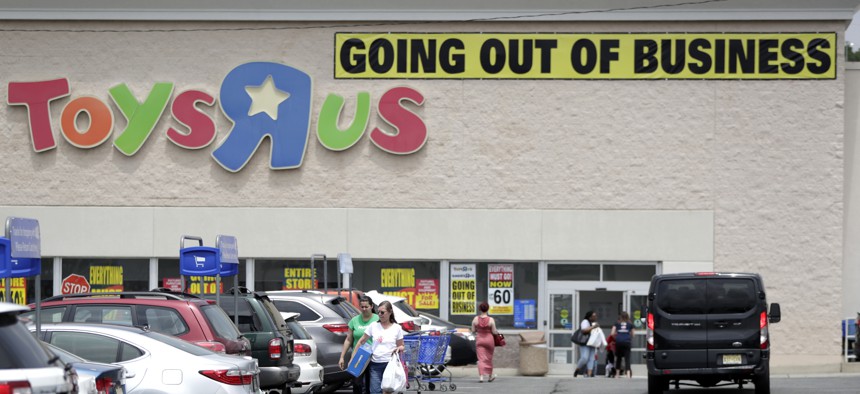For the First Time, a State Will Mandate Severance Pay During Mass Layoffs

A Toys 'R' Us store in Totowa, NJ, having a closing sale in June 2018. AP Photo/Julio Cortez
Inspired by the closure of Toys ‘R’ Us amid bankruptcy, New Jersey passed a law to protect employees during large-scale cutbacks.
A new law in New Jersey aims to provide workers with more protections in the face of mass layoffs.
Gov. Phil Murphy signed the Worker Adjustment and Retraining Notification, or WARN Act, into law this week, which makes the state the first in the nation to mandate severance pay for mass layoffs. The law also increases the notice time employers must give their workers before mass layoffs.
The legislation only applies to businesses with 100 or more full time employees who plan to layoff 50 or more employees at once. Under the new law, which goes into effect in July, businesses will have to give their worker at least 90 days notice before a mass layoff and provide them with severance pay equal to one week for each year of service. If the state concludes that a business didn’t follow the law, the company will be required to add an extra month’s worth of pay to employees’ severance packages.
Much of New Jersey’s workforce is employed by small businesses that won’t be affected by the law.
Throughout its time in the state legislature, the measure was referred to as the “Toys ‘R’ Us bill,” in reference to the 2018 shuttering of the retail giant Toys ‘R’ Us, which left over 30,000 employees nationwide without a job or severance as the company declared bankruptcy. About 2,000 jobs were lost in New Jersey.
State Sen. Nellie Pou, a Democrat who sponsored the legislation, said in a statement that employees in the state deserve the protections of the new legislation. “In the event of corporate losses and bankruptcies, the first people to think of, the first people to protect, must be the employees,” Pou said. “When Toys R Us went under, they left their employees out in the cold with next to no paycheck or lead time to prepare while the executives divvied up massive bonuses. This is unacceptable and the workers of New Jersey deserve better.”
Public outcry over the lack of severance pay for workers—while top executives received $21 million in bonuses during the bankruptcy proceedings—eventually prompted two of the private equity firms that owned Toys ‘R’ Us to establish a $20 million severance fund. Some employees also sued and agreed to a $2 million settlement last year.
Naomi Williams, a professor of labor studies and employment relations at Rutgers University, said the Toys ‘R’ Us severance fund proves the need for the new legislation. “The severance fund would never have been offered without public pressure,” Williams said. “Workers shouldn’t have to depend on general good will for standard protections. Abrupt layoffs put people living paycheck-to-paycheck in a precarious position. Working families need protection.”
There were at least twelve recent layoffs of 50 people or more in New Jersey through December and January. The 4,000 people who lost jobs included employees who worked for a medical center, an international fragrance company, and chain apparel retailers.
Several industry groups, including the New Jersey Business and Industry Association, have voiced opposition to the new law. “This law will force businesses to make difficult decisions about reductions in workforce in a more compressed time frame, which could lead to unintended consequences,” said Michael Wallace, the senior vice president of government affairs for the NJBIA. “Overall, it will add to the many challenges New Jersey faces in attracting businesses, and it will add to the burdens business owners already face in operating their businesses in our state.”
Williams said that industry groups often say employee protections will make the state less attractive to businesses. “But if you look at the states with the strongest employment laws, like California, Massachusetts, and New Jersey, they’re not suffering,” she said. “We saw the same criticisms of the $15 minimum wage, and we haven’t seen drastic loss of business in the states and localities that have implemented it.”
The current legislation is the latest in a series of moves taken by New Jersey to enhance worker rights and protections. The state is also phasing in a $15 minimum wage by 2024, cracking down on employee misclassifications for independent contractors, and mandating paid sick leave for all employees.
All these measures are critical to an evolving economy where companies are globalized, unions are less powerful, and gig work is on the rise, Williams said. “Over the last 45 years, the nature of work has changed but the nature of employment law hasn’t kept pace,” she said. “We need more stability for workers—because that leads to a robust economy.”
Emma Coleman is the assistant editor for Route Fifty.
NEXT STORY: State Lawmakers Backtrack on a Tax Code Revamp






